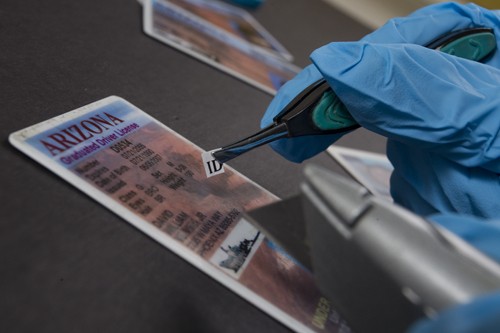The average college student does not turn 21 until his or her junior year, meaning approximately half of all undergraduates are not of legal age to drink.
Yet, young people flood bars near the UA’s campus, ordering drinks every weekend.
Twenty-seven percent of 12 to 20-year-olds drink alcohol, according to the 2009 National Survey on Drug Use and Health. Arizona mirrors the national trend with 27.4 percent of respondents drinking in the past month and 16.8 percent of those binge drinking.
With 59 minor in possession arrests made by the Tucson Police Department this year to date, students are finding a way to drink underage.
“”I definitely know that a lot of kids have them (fake IDs),”” said Hilary Zenuk, a pre-medical freshman. “”It’s obviously really popular, especially with all the bars on University (Boulevard) and Fourth (Avenue) being nearby. People want to drink.””
Zenuk said the riskiest thing about obtaining a fake ID is that people who create them illegally cannot guarantee their reliability. It’s a matter of getting caught.
“”If someone uses a fake and we notice it, we immediately take it away, call police and file a report,”” said Brett Rucker, manager at Gentle Ben’s Brewing Co. Gentle
Ben’s doesn’t have many issues with fake IDs, according to Rucker, but nearly all of these fake ID incidents involve UA students.
Katie McLaughlin, 23, a bartender at O’Malley’s On Fourth, said that all of the doormen must take a class through the liquor department to ensure they are trained to spot a fake ID.
McLaughlin said she and other bartenders at O’Malley’s catch most fake ID users during the weekend and only occasionally during the week.
“”It pretty much happens every Thursday, Friday and Saturday night,”” she said.
McLaughlin said O’Malley’s uses procedures similar to Gentle Ben’s to deal with fake IDs.
“”We do not give it (the ID) back to them under any circumstances,”” she said.
With a grant from the Arizona Governor’s Office of Highway Safety to deal with alcohol and underage drinking, the University of Arizona Police Department aims to show the safety and legal risk involved in using false IDs to get into these bars is far more expensive than the potential bar tab.
Once the use of a fake ID has been reported, police can do either one of two things, according to Sgt. Juan Alvarez, UAPD public information officer. The person can be cited and released, as usually happens with students, or they can be arrested and booked into jail for a misdemeanor charge.
A person caught trying to use a fake ID could be charged with a Class 2 misdemeanor and receive a maximum of four months in jail and a fine of no more than $750. They could also be charged with a more serious Class 1 misdemeanor, with a maximum of six months in jail and up to a $2,500 fine can be imposed for the charge.
“”It all depends on the judge,”” Alvarez said.
In regards to underage drinkers faking their way into nearby bars, Josh Davis, 22, a junior business major, said he has seen bar employees ask a variety of questions to test the card holder’s true identity.
There’s some (bartenders) that ask what your astrological sign is. The person really has to make sure they know all the information on it,”” Davis said.
Alvarez said it is common for police to see students returning to campus after hitting the bars. He gave the example of finding separate identifications for two different people in the same wallet, after stopping a person for a law violation or probable cause. The same misdemeanor charges can be applied.
UAPD can’t always be on the case.
“”People at the bars have the right to refuse service to anyone … We just simply don’t have the time to be at every bar, every weekend,”” Alvarez said. “”We try to avoid acting as an ID checking service.””
He added that UAPD needs officers ready to respond to all other issues in order to provide the best service to the community. Tucson Police Department often responds to fake ID cases, depending on the scenario and location.









